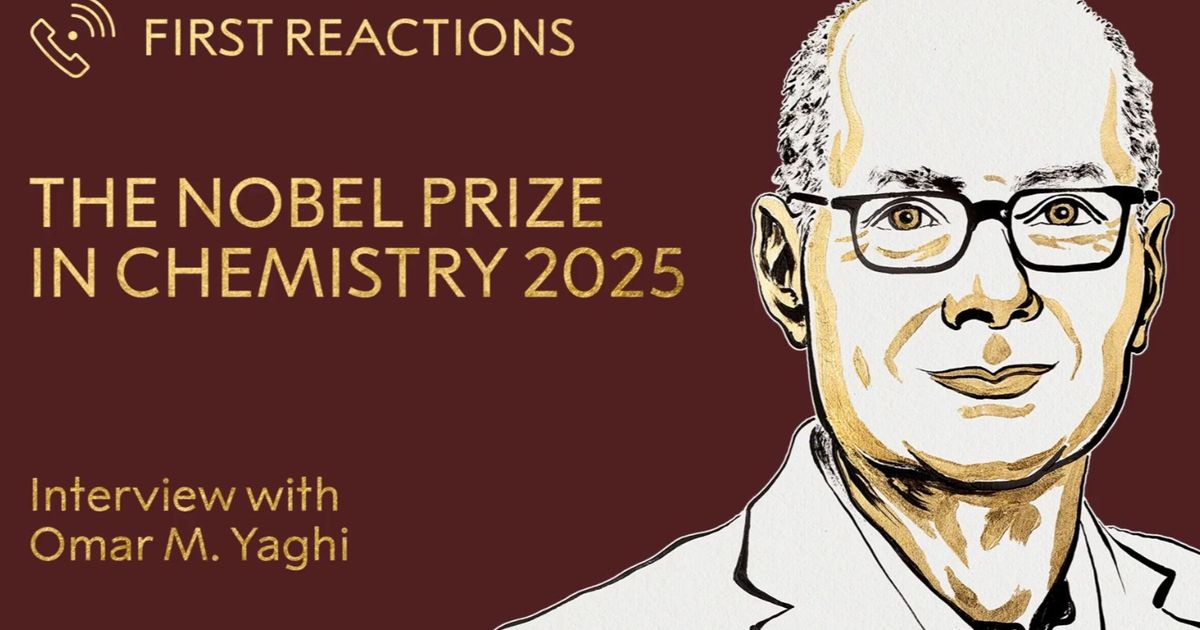Arabic scientific Omar Yaghi, a difficult start between poverty and asylum university of Melbourne, and Japanese Susumu Kitagawa. Of Kyoto University. With this victory, Yaghi joins the elite of scientists who have changed the course of modern chemistry, to an inspiring human journey that began in difficult circumstances and ended with the global recognition of the value of his research, which will immortalize his name in the history of science. Who is this scientist … and how did he reach the Nobel Prize today? Small apartment, Big Dreams Omar Yaghi, who works at the University of California in Berkeley, was born in Amman on February 9, 1965 and won the Arab Genius Award in 2024. His family was moved from Jaffa to the Nakba in 1948, and he took in a poor environment with nine hours a week in a few hours. In an interview with the official website of the award after announcing his victory, Yaghi said: ‘It was a long journey … I grew up in a poor family, in a home consisting of nearly one room, with a large family refugees, and my father and mother could barely read and write, but determination and the love for science and chemistry made me in my career. He added: “I fell in love with chemical molecules when I was ten years old, and I discovered that when you learn how to control chemistry, you can solve many problems – small and large – as if you have an almost magical ability, or discovered a secret language to build the universe.” Since then, he has decided to devote his life to understanding this language and its use to serve humanity. The journey of challenges started early. Yaghi moved to the United States at the age of fifteen, despite his lack of skill in the English language, and he excelled academically and received a doctorate in chemistry at the University of Illinois in 1990. Since then, he has begun searching for systematic ways to design new materials instead of trusting and error. He lived in a poor refugee family with 9 brothers in one room, and his parents could barely read and write. Yaghi holds the title of university professor, which is the highest academic rank. He also works at the Lawrence Berkeley National Laboratory. He is the founder and director of the Berkeley International Science Laboratory, and an elected member of the US National Academy of Sciences and the German National Academy of Sciences “Leopoldina.” In January 2025, Yaghi became the seventh president of the World Culture Council, an international organization that deals with the promotion of cultural values and charity work. As for his scientific career, he said: “My dream was to publish one scientific article, but I finally published hundreds.” ‘Smart people everywhere’ Yaghi are known for establishing the science of reticular chemistry, which focuses on linking molecular building blocks with strong bonds to form open frameworks, which are used in various applications, especially metal organic frameworks (MOFs). One of its most striking achievements is the development of devices to extract water from dry air, even in deserts with low humidity. In his lab in Berkeley, he sees water drops in a closed box with mof crystals and says, “When I see the drops, it was one of the most wonderful moments in my life … It means I can create water where there is no water.” Yaghi won prestigious international awards, especially the Cavli Prize for Chemistry in 2018, and appeared repeatedly on the list of ‘the most influential scientists in the world’ thanks to more than 300 scientific articles quoted more than 200,000 times. In February 2024, Sheikh Mohammed Bin Rashid Al Maktoum honored him with the ‘Geniuses of the Arabs’ Award in the Category of Natural Sciences in recognition of his exceptional contributions. As for his position on science and scientists, he said he was “convinced that intelligent people existed all over the world, but that they needed the appropriate environment to thrive and perform, and to have the appropriate opportunity to benefit the world.” Discoveries that change people’s lives, the winner of the Nobel Prize for Chemistry, receives 11 million Swedish Krona (approximately $ 1.17 million), in addition to a gold medal from the King of Sweden. The Chemistry Prize is the third prize to be announced annually after the medicine and physics prices. “Smart people are all over the world, give them just the right chance.” Omar Yaghi, the Arab scientist who won the Nobel Prize for Chemistry 2025. The awards administration pointed to three chemical discoveries that have changed people’s lives: molecules to facilitate the production of medicine, plants that transform carbon dioxide into carbohydrates, and the targeted evolution of enzymes to manufacture more environmentally friendly chemicals. Who wins the Nobel Prize? On November 27, 1895, Swedish dynamite invinder Alfred Nobel signed his last will and will and awarded most of his fortune to award a series of prizes annually for distinctive contributions to science, literature and peace, with a prize later for economics. The names of the winners are announced in October of each year, and the awards are officially presented during lavish celebrations on December 10, the day of Nobel’s death, in the presence of the royal families of Sweden and Norway.
The challenge of poverty and asylum until Nobel has won. This is the Arab world Omar Yaghi
